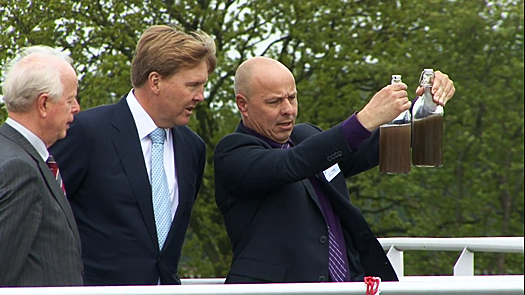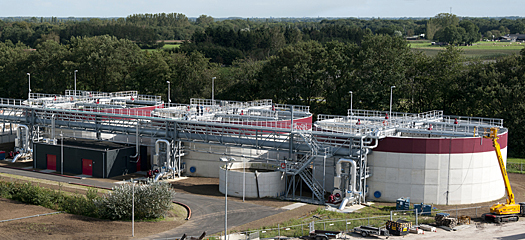Official commissioning Nereda at wwtp Epe: Wonder-granule keeps its promise
The up scaling of process conditions to form aerobic granular sludge in a municipal waste water treatment plant has successfully been completed at the first full scale Nereda plant at Epe, the Netherlands.
World's first wwtp with natural formed aerobic ganulate sludge, was officially commissioned on May 8. The ceremony was attended by prince of Orange Willem-Alexander.
Ever changing influent
The first full scale Nereda installation is already operational since summer last year. According to Helle van der Roest, senior water expert at DHV, the company that developed the new technology in joint cooperation with Delft University of technology, the process of forming of the natural granulate has successfully been adapted to the hard circumstances of the day-to-day handling of waste water, with varying of both the quantity, temperature and quality of the influent.

Responsible for the daily operations of wwtp Epe, Douwe Jan Tilkema of water board Veluwe, shows the sedimentation of conventional sludge, compared to the much faster sedimentation of granulated Nereda-sludge. Watching are the prince of Orange (middle) and water earl Gert Verwolf of water board Veluwe (left).
Batch wise operation in three tanks
In the nineties of last century aerobic granular sludge was shown in laboratories for the first time. The research was initiated by the Delft University of Technology and the technical University of Munich. Fundamental research has been booming ever since and has given insights into the granulation process, although to date all mechanisms are still not fully understood.
On the other hand it has become clear that specific process and operational conditions play an important role for granulation and can be met using a batch wise operation. Both batch wise operation and excellent sludge settling properties are combined in the Nereda process.
Three processes with one granule
The cycle comprises of a first step in which fill and draw are combined. During this cycle step wastewater is pumped into the reactor and at the same time effluent is withdrawn. The combination of anaerobic conditions with high substrate concentrations promotes phosphorous release.
In the second step the biological conversion processes take place. The outer layer of the granules is aerobic and here nitrifying bacteria accumulate. The formed nitrate is denitrified in the anoxic inner core of the granules, where sufficient substrate is available as a result of the first phase.
Due to aerobic conditions also phosphorous uptake occurs. In the last step of the cycle the settling of granular biomass takes place.
No sedimentation tanks
Since the granules have excellent settling properties, settling time can be very short. Typical SVI values of 20 to 60 ml/g after 5 minutes of settling are seen. To enhance the denitrification capacity of the granules, separate anoxic phases can easily be introduced before and after the second part of the cycle, the aeration phase. These additional anoxic phases can be necessary, related to influent composition, effluent requirements and process conditions (e.g. temperature).
As a consequence, Nereda is capable of achieving stringent effluent requirements and is very energy efficient since no (sludge) recirculation is required.
Step to full scale Nereda
Based on the results of the pilot research program and the excellent results of demonstration installations, the step to full scale Nereda applications are now within reach. The worldwide first full scale installation in Epe, the Netherlands is designed for 59,000 P.E. and a peak flow of 1,500 m3/h and consists of a conventional pretreatment to cope with the industrial waste discharges from two slaughterhouses.
To meet the stringent effluent requirements (TN < 5 mg/l and TP < 0.3 mg/l) the Epe plant is equipped with a sand filtration unit.
Two other municipal installations in the Netherlands are in the design phase and will benefit in 2012 from the granules that are being produced in the wwtp Epe.
More information
DHV
Amersfoort, the Netherlands
helle.vanderroest@dhv.com
+31 88 348 24 07
www.dhv.com/nereda




